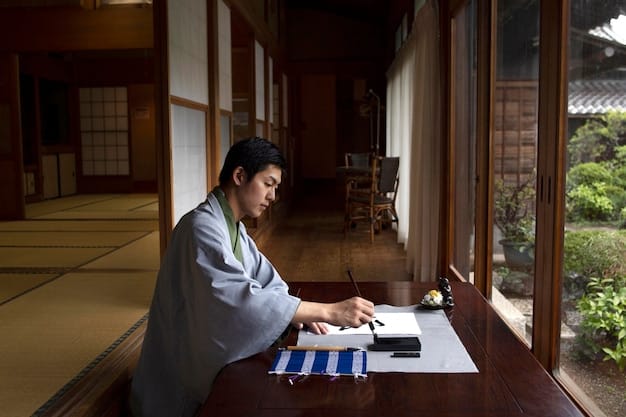Beyond Subtitles: 3-Month Guide to Learn Japanese with Dramas

Beyond the Subtitles: Learning Basic Japanese from Watching Dramas – A 3-Month Guide offers a structured approach to language acquisition by integrating authentic cultural experiences through Japanese dramas, enhancing vocabulary, grammar, and comprehension skills effectively alongside entertainment.
Want to learn Japanese in a fun and engaging way? This 3-month guide, Beyond the Subtitles: Learning Basic Japanese from Watching Dramas – A 3-Month Guide, will show you how to use your love of Japanese dramas to learn basic vocabulary, grammar, and cultural context, taking you from subtitle reliance to confident understanding.
Unlock Japanese Fluency: The Drama-Based Learning Advantage
Learning a new language can feel daunting, but what if you could combine education and entertainment? Japanese dramas, or “doramas” as they’re often called, offer a unique opportunity to immerse yourself in the language and culture. This method isn’t just about passive viewing; it’s about actively engaging with the language to build a solid foundation.
By leveraging the compelling storylines and realistic dialogues found in dramas, you can naturally absorb vocabulary, understand sentence structures, and even pick up on subtle cultural nuances. This approach is far more engaging than traditional textbook learning and can accelerate your progress in a surprisingly enjoyable way.
Why Japanese Dramas?
Japanese dramas provide a rich context for language learning that textbooks simply can’t match.
- Authentic Language: Dramas showcase how native speakers actually communicate, including slang, idioms, and everyday expressions.
- Visual Context: The visual nature of dramas aids comprehension. You can often infer meaning from actors’ expressions, gestures, and the overall setting.
- Cultural Immersion: Dramas offer a window into Japanese culture, customs, and social norms, making the learning process more enriching.
- Motivation: If you’re already a fan of Japanese dramas, this method leverages your existing interests to maintain motivation and keep you engaged.
Utilizing these benefits, you’ll not just learn the language itself, but also the cultural nuances tied into its usage.
In conclusion, using Japanese dramas is more than just a fun way to learn; it is an efficient strategy to absorb and retain the language naturally.
Setting Up Your 3-Month Learning Plan
Before diving into the world of Japanese dramas, it’s important to establish a structured plan. This will help you stay focused, track your progress, and ensure you’re making the most of your time.
This three-month approach is designed to incrementally increase your understanding and comfort levels with the Japanese language, turning passive viewing into active learning.
Week 1-4: Building a Foundation
Focus on mastering basic vocabulary and grammar. Watch episodes with subtitles and actively note down new words and phrases.
- Choose Beginner-Friendly Dramas: Start with dramas that have clear dialogue and simple plots, like school dramas or slice-of-life stories.
- Active Note-Taking: Keep a notebook and pen handy. Pause the show whenever you encounter new vocabulary or grammar points. Write down the word or phrase, its definition, and the context in which it was used.
- Review and Practice: Dedicate time each day to review your notes. Practice saying the new words and phrases aloud. Try to use them in simple sentences.

Consistency during these initial weeks is key for building a strong foundation.
In summary, this initial phase is about familiarizing yourself with the basics and making language learning a consistent part of your routine.
Drama Selection: Choosing the Right Content
Not all dramas are created equal when it comes to language learning. Selecting the right dramas can significantly impact your learning experience and effectiveness.
The ideal drama should be engaging enough to keep you motivated but also manageable in terms of language complexity.
Factors to Consider
Think about choosing content that aligns with your current language level and interests.
- Genre: Opt for genres that typically feature everyday conversations, such as romance, family dramas, or comedies. Avoid complex historical dramas or intense medical dramas early on.
- Dialogue Speed: Be mindful of the dialogue speed. Some dramas have fast-paced conversations that can be overwhelming for beginners. Look for dramas known for their moderate to slower pacing.
- Subtitle Availability: Ensure that accurate subtitles are available. While the goal is to eventually move beyond subtitles, they are essential in the initial stages of learning.
Proper selection of dramas will ease your assimilation into the Japanese culture and it’s language.
To conclude, carefully choosing dramas can streamline your language learning journey, providing steady, manageable learning.
Active Viewing Techniques: Engaging with the Language
Watching dramas for language learning isn’t just about passively absorbing information; it’s about actively engaging with the language and content.
This requires a strategic approach to viewing that goes beyond simply reading subtitles.
Techniques for Maximizing Learning
Here are some methods you can use to make your viewing more constructive.
- Pause and Repeat: Pause after each line and repeat what the characters say. This improves your pronunciation and helps you internalize sentence structures.
- Shadowing: Try shadowing the actors—speaking along with them in real-time. This is an excellent way to improve your fluency and rhythm.
- Subtitle Removal: Gradually reduce your reliance on subtitles. Start by turning them off for short segments and try to understand what’s being said. Increase the duration as you become more comfortable.
Implementing these techniques in your lesson will prove advantageous over time.

In conclusion, active viewing is important for learning efficiently, helping you remember, practice, and comprehend new information better.
Understanding Grammar Through Context
Grammar can often seem like a dry and abstract subject, but learning it in the context of Japanese dramas makes it much more engaging and memorable.
By observing how grammar is used in real-life conversations, you can gain a deeper understanding of its practical application.
Spotting Grammatical Patterns
Consider implementing these practices to boost grammar learning.
- Pay Attention to Sentence Structure: Notice how sentences are structured and how word order affects meaning. Japanese follows a subject-object-verb (SOV) structure, which is different from English.
- Identify Particles: Japanese particles (like wa, ga, o, ni, de) are crucial for understanding the grammatical function of words in a sentence. Pay attention to how these particles are used and what they indicate.
- Recognize Verb Conjugations: Japanese verbs change form depending on the tense, politeness level, and other factors. Pay attention to these conjugations and try to understand the rules behind them.
Grammar usage in drama showcases real-life usage and allows you to build stronger knowledge.
Integrating grammar learning within the interactive format of dramas allows understanding the structure of language seamlessly.
Cultural Insights and Etiquette
Language and culture are inextricably linked. Japanese dramas offer a unique opportunity to learn about Japanese culture, customs, and etiquette while you’re improving your language skills.
In addition to understanding the language aspect, absorbing cultural contexts makes one well informed.
Subtleties of Japanese Culture
Dramas can provide insight into many different cultural factors.
- Honorifics: Pay attention to how characters address each other. The use of honorifics (like -san, -sama, -kun, -chan) indicates the level of respect and relationship between speakers.
- Body Language: Observe nonverbal cues like bowing, facial expressions, and gestures. These can convey important social meanings.
- Social Norms: Notice how characters interact in different social situations, such as at home, at work, or in public. This will give you a sense of Japanese social etiquette.
Culture informs a large part of language understanding and usage.
Japanese dramas, thus, serves as an excellent vessel for understanding both language and culture.
Tracking Progress and Staying Motivated
Learning Japanese through dramas is an exciting journey, but it’s important to track your progress and find ways to stay motivated throughout the process.
The importance of tracking progress and retaining enthusiasm cannot be overstated.
Effective Ways to Stay Inspired
Consider these steps for sustaining inspiration.
- Keep a Language Learning Journal: Regularly jot down new vocabulary, grammar concepts, and cultural insights you’ve learned from watching dramas.
- Join Online Communities: Engage with other learners in online forums or language exchange groups. Sharing your successes and challenges can provide encouragement and support.
- Set Realistic Goals: Set small, achievable goals for yourself, such as learning a certain number of new words each week or understanding a specific grammar point.
Keeping up excitement goes hand-in-hand with tracking progress.
| Key Aspect | Brief Description |
|---|---|
| 🎬 Drama Selection | Choose dramas with clear dialogue and relatable plots for effective learning. |
| ✍️ Note-Taking | Record new vocabulary and grammar, reviewing regularly for enhanced retention. |
| 🗣️ Active Viewing | Employ techniques like pausing and repeating lines to improve pronunciation. |
| 🏆 Cultural Immersion | Understand etiquette and social cues, enhancing language understanding. |
FAQ
▼
While dramas alone aren’t a complete solution, they’re an excellent tool for immersive learning. Pair them with structured study for faster progress.
▼
Start with slice-of-life dramas or comedies set in modern Japan that feature everyday conversations and scenarios for easy comprehension.
▼
Aim for 5-10 hours per week. Consistency is key, so integrate it into your daily schedule for steady, noticeable improvements.
▼
Don’t get discouraged. Look up the word or phrase online, or ask for help on a language learning forum to clarify meanings.
▼
Focus on both! Practice shadowing and repeating lines to improve speaking, while also actively listening to dialogues for better understanding.
Conclusion
By following this 3-month guide, you can effectively learn basic Japanese through the immersive experience of watching dramas. Remember to choose the right content, actively engage with the language, and stay motivated. Happy learning!





